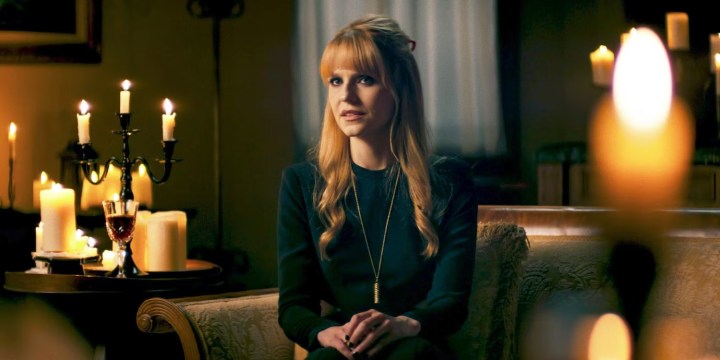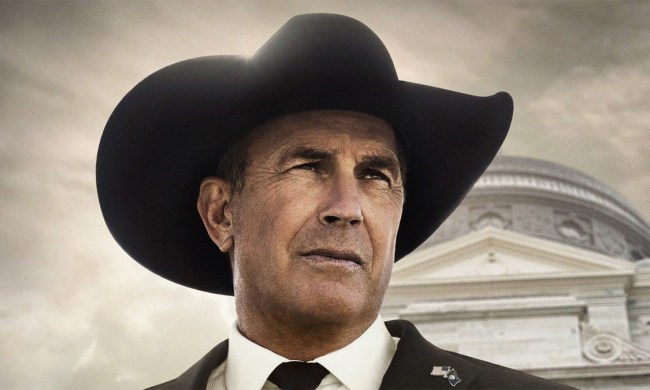By now, everyone knows the story: boy meets girl, girl agrees to marry boy, boy ventures off to a faraway land and encounters the lord of the vampires, boy realizes girl is in trouble, and … well, you know the rest. The story of Dracula has been told on the big screen many times since it was first published in 1897 with filmmakers as varied, as F.W. Murnau, Mel Brooks, and Francis Ford Coppola taking a stab (ahem) at the tale.
Now, noted playwright and director Neil LaBute is tackling the venerable story, albeit with a muted twist that de-emphasizes the fangs and gore and concentrates more on the power dynamics between his male and female characters. In a conversation with Digital Trends, LaBute and actress Gia Crovatin discuss what drew them to House of Darkness, what their favorite horror movies are, and why the film could appeal to jaded horror fans.

Note: this interview has been condensed for clarity and length.
Digital Trends: What compelled you to make House of Darkness?
Neil LaBute: There were artistic and economic reasons, to be honest. The idea for this movie began when COVID was at its height, and I was looking for something I wanted to do in a situation that was difficult in mounting a normal, full-fledged production. I already had a script that required a small cast and limited locations. That translated into fewer production days.
Also, I’ve always liked chamber pieces. I’ve done a lot of theatre and film, so House of Darkness felt more controlled and smaller than other things. It fit right in with the work I had done previously, and it felt like it was the right time to do it.
Gia Crovatin: I love Neil’s work. I’ve frequently collaborated with him on other projects. I think his writing is superb. He writes about how people talk and think. I’ve played a vampire before, but this character had a very special, underground vibe to her that I liked. I loved the sister dynamic between her and Kate Bosworth’s character, Mina, as well.
I’m a super bubbly person in real life and Lucy is a bit of an introvert. She’s a detective of what’s going on in the world and she’s had a lot of time to think about her life and why it turned out the way it did.
House of Darkness harks back to the Hammer horror films of the 1960s and yet still has the LaButian touch. How did you maintain that balance and what kind of research, if any, did you do to successfully create your own horror film?
LaBute: In terms of balance, the visual stuff I would hand over to the team that I was working with: the costume designer, the production design team, etc. We found this beautiful house in Arkansas that was perfect for the film. The director of photography, Daniel Katz, captured this modern take on an old Gothic look that looked and felt really elegant yet creepy. It was just slightly hyperrealized, like the events in the film could realistically happen, but the feel of it is slightly elevated.
I had to be a bit of a magician with this kind of stuff. I led the audience in one direction and then secretly led them in another one. For me, it was taking what is looking like a stereotypical bad date at the beginning of the film and turning the tables a bit, which is part of the fun of House of Darkness. I still get to talk about the power dynamics in relationships that I’ve always talked about on stage and screen, but I just put that in a neo-Gothic film.

In terms of how I make my own horror film, sometimes you pull back on what people might expect. For example, in a scene from House, there should be a jump scare there, but instead, I cut and don’t make a jump scare out of it. It’s just a moment; there’s no real terror there. I emphasized the anticipation of horror rather than traditional scares.
But I don’t want to lie to the audience. In the last 10 minutes of the film, I give them what they want, with with flesh being shredded and blood spurting. For some folks, it’s probably not nearly enough, but I am giving them that horror element. I may have tricked them, but I haven’t lied to them.
Gia, what is it about the horror genre that appeals to you?
Crovatin: To be honest with you, I don’t really like the horror genre as a viewer. I’m a super-sensitive person and I get scared really easily, so horror is not a comfortable place for me to want to live in or work in. Sometimes, though, you have to run toward the things that you scare you, and fear is a thing that scares me. [Laughs]
I also think the genre is a great way to talk about our society at large as well. You’re using this huge metaphor, vampires, and how it mirrors our own world in a really interesting way.
House of Darkness feels less like a horror movie to me than a psychological thriller. To me, I can see the direct lineage from this movie to some of Neil’s earlier work like In the Company of Men. They are exactly the same except there’s just more blood. The pain and the human cruelty is what links those two films.

Neil, with your Wicker Man remake with Nicolas Cage and, more recently, the Van Helsing series, you’ve shown an interest in the horror genre and, specifically, vampires. Why use the horror genre to comment on the power dynamics between men and women in 2022?
LaBute: With some of my previous films like In the Company of Men and Your Friends & Neighbors, I’ve already commented on those relationship dynamics in a straightforward way. I had find a new way in that feels fresh to me and with House of Darkness, I did that by making a Hammer Films-style horror film.
What are some of your favorite horror films?
LaBute: I love the original Dracula with Bela Lugosi, The Only Lovers Left Alive with Tilda Swinton and Tom Hiddleston, and Trouble Every Day. I’m all over the map with vampire movies. I love the old Hammer movies. Near Dark is one of my favorites.
Crovatin: I’m going to go with a classic: Psycho. It’s so psychological. It’s art. But a recent film I saw that I absolutely loved was Mike Flanagan’s Hush with Kate Siegel. It was just a revelation. Kate was so bananas good in that movie. I like when horror movies take things and turn them on their end. What you expect turns out to be the opposite of what you thought. And I think our movie does that.
What do you want viewers to get out of House of Darkness?
Crovatin: I think that the movie’s about being honest and owning up. The truth will set you free and karma will come get you if you’re not telling the truth.
LaBute: House of Darkness is just a fun time at the cinema. It’s an additional avenue into the darkness. For 90 minutes, it allows you to escape and allows the audience to live out a fun and fantastical story. Even if you seen this story before, there’s going to be some twists and turns you don’t expect.
House of Darkness is now in theaters and is available On Demand.



